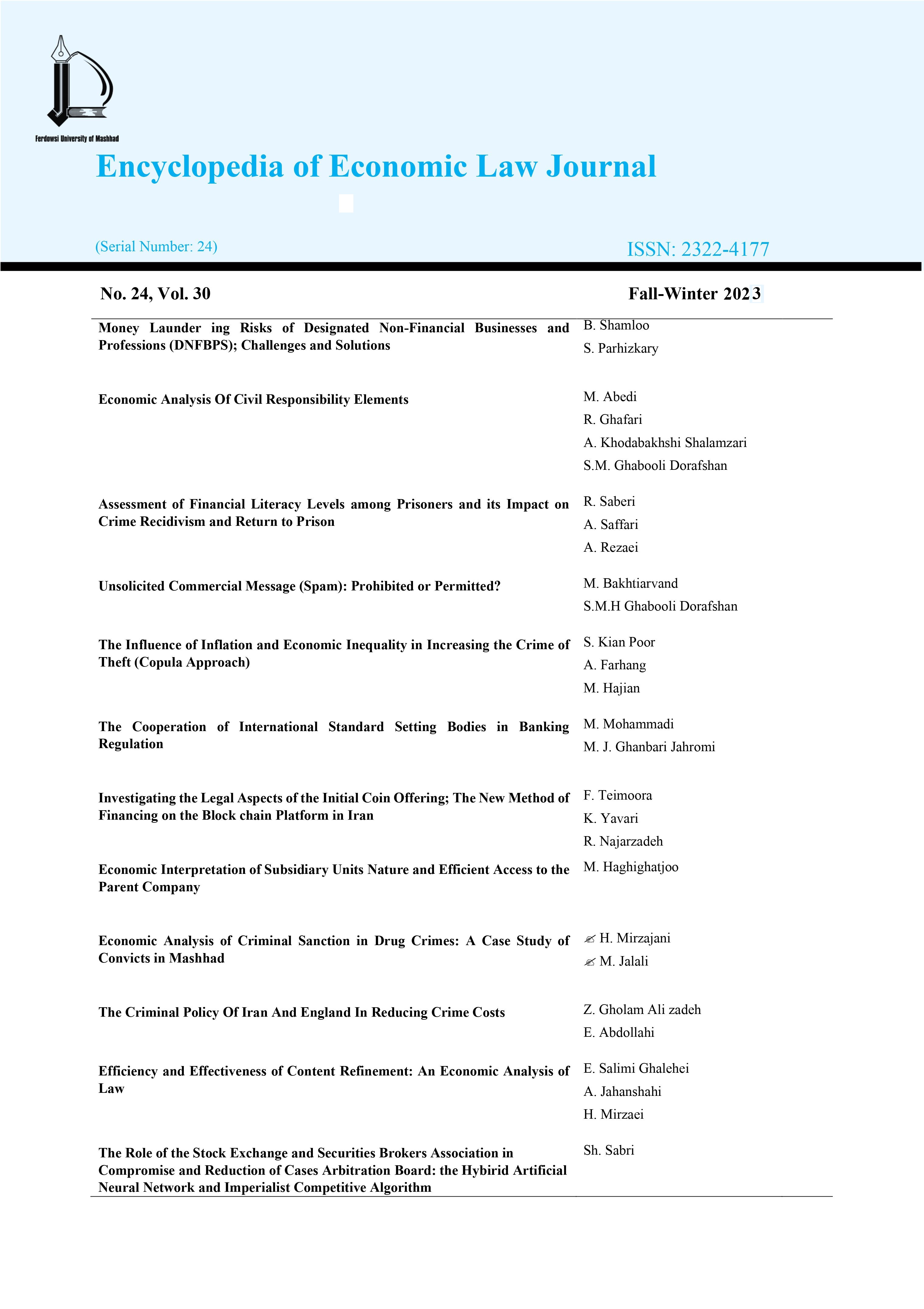[1] Akbari, A., & Gabdulhakov, R. (2019). Platform Surveillance and Resistance in Iran and Russia: The Case of Telegram. Surveillance & Society, 17(1/2), 223–231.
[2] Alvani, S. (2000). Decision making and government policy determination. Tehran: Samt Publication.
[3] Andersen, M. (2013). Criminal displacement, encyclopedia of delinquency and crime prevention. translator: Fatemeh Qanad. Tehran: Mizan Publications.
[4] Aos, S., Phipps, P., Barnoski, R., & Lieb, R. (2002). The Comparative Costs and Benefits of Programs to Reduce Crime. London: Routledge.
[5] Ardabili, M. (2013). Criminal Law. Vol 1. Tehran: Mizan.
[6] Ardabili, M. (2015). Criminal Law. Vol 2. Tehran: Mizan.
[7] Arrow, K. J. (1951). An Extension of the Basic Theorems of Classical Welfare Economics. Stanford University, 2, 507-532.
[8] Babazadeh Moghaddam, H., & Asasdi, A. (2017). Principles for filtering news websites. New Media Studies, 3(9), 164-194.
[9] Bergson, A. (1938). A Reformulation of Certain Aspects of Welfare Economics. The Quarterly Journal of Economics, 52(2), 310-334.
[10] Cohen, M. A. (2020). The Costs of Crime and Justice, London: Routledge.
[11] Dadgar, Y. (2018). An introduction to the economic analysis of law. Tehran: Tarbiat Modares University Economics Research Institute Publications and Noor Alam Publications.
[12] Deibert, R., Oliver, J. and Senft, A. (2019), Censors Get Smart: Evidence from Psiphon in Iran. Rev Policy Res, 36: 341-356.
[13] Deibert, R., Oliver, J., & Senft, A. (2019). Censors Get Smart: Evidence from Psiphon in Iran. Review of Policy Research, Volume36, Issue3.
[14] Dreze, J., & Stern, N. (1987). Handbook of Public Economics. London: Elsevier.
[16] Fazaeli, M. & Karami, M. (1400). A reflection on the protection of the right to freedom of expression in the procedure of the European Court of Human Rights regarding the blocking of Internet access. New Technologies Law, 2(4), 155-182.
[17] Fazli, M. & Babayi, M. (2016). Criminal data filtering on the Internet from the perspective of economic criminal policy, The first national conference on facing cybercrimes, challenges and solutions. Tehran, Fata.
[18] Feinberg, J. (1984). The Moral Limits of the Criminal Law Volume 1: Harm to Others. New York: Oxford University Press.
[19]
Friedman, L. (1975).
The Legal System: A Social Science Perspective. U.S: Russell Sage Foundation.
[20] Fuller, L. (1968). Anatomy of law. London: Penguin Publication.
[21] Haji Deh Abadi, M. A., salimi, E., & Dehghani, P. (2022). Legal-Criminological Pathology of Cyberspace Refinement in Iran. ModernTechnologies Law, 3(6), 77-94.
[22] Henderson, J., & Quandt, R. (1958). Microeconomic Theory: A Mathematical Approach. New York: McGraw-Hill Book Company.
[23] Hummel, R. & Hummel, P. (2014). Implementation of crime prevention: optimal governance and science of implementation, Oxford Encyclopedia of Crime Prevention. Tehran: Mizan Publications.
[24] Kelly, J. (2003). A shot history of western legal theory. Translated by Rasekh, M. Tehran: Tarhe No.
[25] Kvalnes, Ø. (2019). Moral Reasoning at Work. Springer International Publishing.
[26] Layard, R., & Walters, A. (1987). Microeconomic Theory (international edition ed.). New York: McGraw-Hill Book Company.
[27] Mirkhalili, S. M. (2012). Blocking the Means and Preventing Crimes in the Islamic Teachings. Islamic Law, 8(31), 95-125.
[28] Motamedanjad, R. (2017). Duties of governments in the field of digital technologies: from monopolistic government to regulatory government. Journal of News Sciences, 7(28), 9-36.
[29] Mousmouti, M. (2022). Designing Effective Lesgislation. Translaters: Petoft, A. & Jahanshahi, A. Tehran: Library, Museum and Document Center of IRAN Parliament
[30] Naderi, M., & Haji Hasan, M. (2017). Theoretical and Practical Dimensions of Obligationism in Political Thought of Imam Khomeini (RA). The Islamic Revolution Approach, 10(37), 95-116.
[31] Nicholson, W. & Snyder, C (2008). Microeconomic Theory: Basic Principles and Extensions.
[32] Pornajafi, L., Fakhr, H., & Pourghahramani, B. (2022). Filtering the cyberspace as a crime or a way for its prevention?. Criminal Law Research, 13(2), 163-187.
[33] Rahmati, H. A., & Shahriari, H. (2017). Moral Necessities of Content Filtering and Refinement in Cyberspace. Revelatory Ethics, 7(1), 145-170.
[34]Salehi, M. & Fazli, M. (2015). Efficient criminal procedure and Pareto's efficiency problem, Encyclopedia of criminal law and criminology by Dr. Silvia Tellenbach. Tehran: Gam Haq Publications.
[35] Samuelson, P. A. (1947). Foundations of Economic Analysis (Enlarged Edition ed.). Harvard University Press.
[36] Sasan, A. & Sasan, S. Enayati. (2004). Public Finance and Government Policy. Isfahan: Danesh Nama Publications.
[37] Shiravand, M., & Ranjkesh, M. (2016). Review and explain the of consequentialism and Deontologists in Islamic Doctrines. Akhlāq-i zīstī, Vol. 6 No. 19, 7-25.
[38] Smith, Martha Jan (2013) Previous Profit, Encyclopedia of Delinquency and Crime Prevention, Translator: Mehdi Seyedzadeh Sani, Volume 1, Tehran: Mizan Publications
[39] Varian, H. R. (1992). Microeconomic Analysis (3rd ed.). New York: Norton & Company.
[40] West, D. (2016) internet shutdowns cost countries $2.4 billion last year, brookings institution issues in technology innovation.
[41] Zinali, Amir Hamzeh (2014). Criminalization in the field of culture, Majd Publications.


Send comment about this article